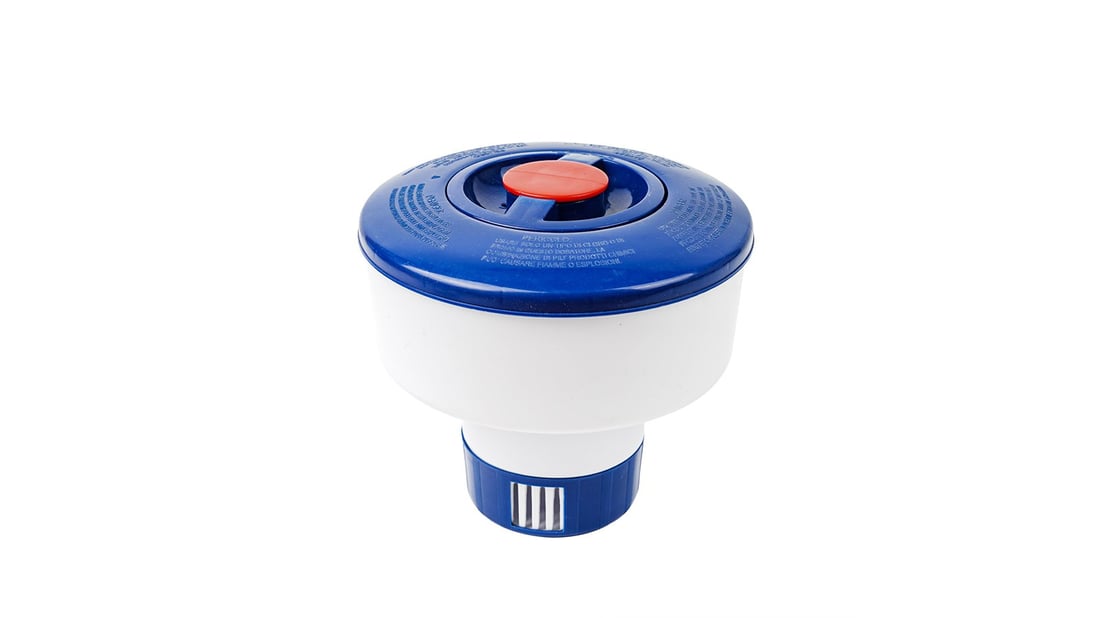Keep Your Pool Sparkling Clean with a floating pool chlorine dispenser
When it comes to maintaining a clean and healthy swimming pool, one of the most important tasks is ensuring that the water is properly sanitized. One effective and convenient way to achieve this is by using a floating pool chlorine dispenser. This device is designed to release chlorine into the water consistently, helping to kill bacteria, algae, and other contaminants. In this article, we will dive into the different aspects of floating pool chlorine dispensers and explore how they can make your pool maintenance routine a breeze.
1. What is a Floating Pool Chlorine Dispenser?
A floating pool chlorine dispenser is a small device that holds chlorine tablets or sticks and releases them into the water to maintain proper sanitation levels. It is designed to float on the surface of the pool, allowing the chlorine to dissolve and disperse evenly throughout the water. This ensures that the chlorine reaches all areas of the pool, keeping it clean and safe for swimming.
2. Benefits of Using a Floating Pool Chlorine Dispenser
Using a floating pool chlorine dispenser offers several advantages over other methods of chlorine distribution. Firstly, it provides a consistent release of chlorine, eliminating the need for manual dosing or frequent adjustments. This saves you time and effort in maintaining the chlorine levels in your pool. Additionally, a floating dispenser helps to prevent the accumulation of chlorine in one area, reducing the risk of localized damage to the pool surface or equipment.
3. Factors to Consider When Choosing a Floating Pool Chlorine Dispenser
When selecting a floating pool chlorine dispenser, there are a few key factors to consider to ensure you choose the right one for your pool. These factors include:
- Pool Size: The size of your pool will determine the capacity and size of the dispenser you need. Larger pools may require multiple dispensers or larger capacity models.
- Chlorine Tablet Compatibility: Ensure that the dispenser you choose is compatible with the type of chlorine tablets or sticks you prefer to use.
- Adjustability: Some floating dispensers offer adjustable settings to control the release rate of chlorine. This can be beneficial if you have specific sanitization requirements.
- Durability: Look for a dispenser made from durable materials that can withstand exposure to sunlight and chemicals commonly found in pools.
4. How to Use a Floating Pool Chlorine Dispenser
Using a floating pool chlorine dispenser is a simple and straightforward process. Follow these steps to ensure proper usage:
- Fill the dispenser with the recommended quantity of chlorine tablets or sticks.
- Adjust the dispenser settings, if applicable, to control the release rate of chlorine.
- Place the dispenser in the pool, ensuring that it floats freely without any obstructions.
- Monitor the chlorine levels regularly and refill the dispenser as needed.
- Store the dispenser in a cool, dry place when not in use to prolong its lifespan.
5. Maintenance and Care for Floating Pool Chlorine Dispensers
To keep your floating pool chlorine dispenser in optimal condition, it is important to perform regular maintenance and care. Here are some tips:
- Clean Regularly: Remove any debris or residue from the dispenser by rinsing it with water regularly.
- Inspect for Damage: Check the dispenser for any signs of damage or wear. Replace any cracked or broken parts immediately.
- Store Properly: When not in use, store the dispenser in a cool, dry place away from direct sunlight and extreme temperatures.
- Replace as Needed: Over time, the dispenser may become less effective or worn out. Replace it when necessary to ensure proper chlorine distribution.
6. Common Troubleshooting Issues with Floating Pool Chlorine Dispensers
While floating pool chlorine dispensers are generally reliable, there may be some occasional issues that arise. Here are a few common troubleshooting tips:
- Inadequate Chlorine Release: If the chlorine levels in your pool are consistently low, check if the dispenser is clogged or the tablets need to be replaced.
- Uneven Chlorine Distribution: Ensure that the dispenser is floating freely and not stuck in one area of the pool. Adjust the water circulation if necessary.
- Dispenser Floating Away: If the dispenser keeps drifting to one side of the pool, consider using a pool anchor or tether to keep it in place.
7. Safety Precautions When Using a Floating Pool Chlorine Dispenser
While floating pool chlorine dispensers are generally safe to use, it is important to take certain safety precautions to avoid any accidents or mishaps. Here are some guidelines to follow:
- Keep out of Reach: Store chlorine tablets or sticks in a secure location away from children and pets.
- Wear Protective Gloves: When handling chlorine tablets or sticks, wear protective gloves to avoid skin irritation or burns.
- Follow Manufacturer Instructions: Always read and follow the manufacturer's instructions for the specific floating pool chlorine dispenser you are using.
- Proper Storage: Store any unused chlorine tablets or sticks in their original packaging and in a well-ventilated area.
8. Alternatives to Floating Pool Chlorine Dispensers
If a floating pool chlorine dispenser does not meet your needs or preferences, there are alternative methods of chlorinating your pool. These include:
- In-Line Chlorine Feeders: These are installed in the pool's plumbing system and automatically release chlorine into the water.
- Chlorine Granules: Instead of using tablets or sticks, you can manually add chlorine granules to the pool water.
- Saltwater Chlorinators: These systems convert salt into chlorine, providing a more natural and continuous sanitization method.
9. Cost and Availability of Floating Pool Chlorine Dispensers
Floating pool chlorine dispensers are widely available and can be purchased from pool supply stores, online retailers, and home improvement stores. The cost of a floating dispenser can vary depending on the brand, features, and capacity. On average, you can expect to spend between $10 and $30 for a high-quality floating pool chlorine dispenser.
10. In Conclusion
A floating pool chlorine dispenser is a valuable tool for maintaining a clean and healthy swimming pool. With its convenience and effectiveness, it ensures that your pool water is properly sanitized and free from harmful contaminants. By considering the factors mentioned in this guide, you can choose the right floating pool chlorine dispenser for your pool and enjoy a sparkling clean swimming experience all season long.

